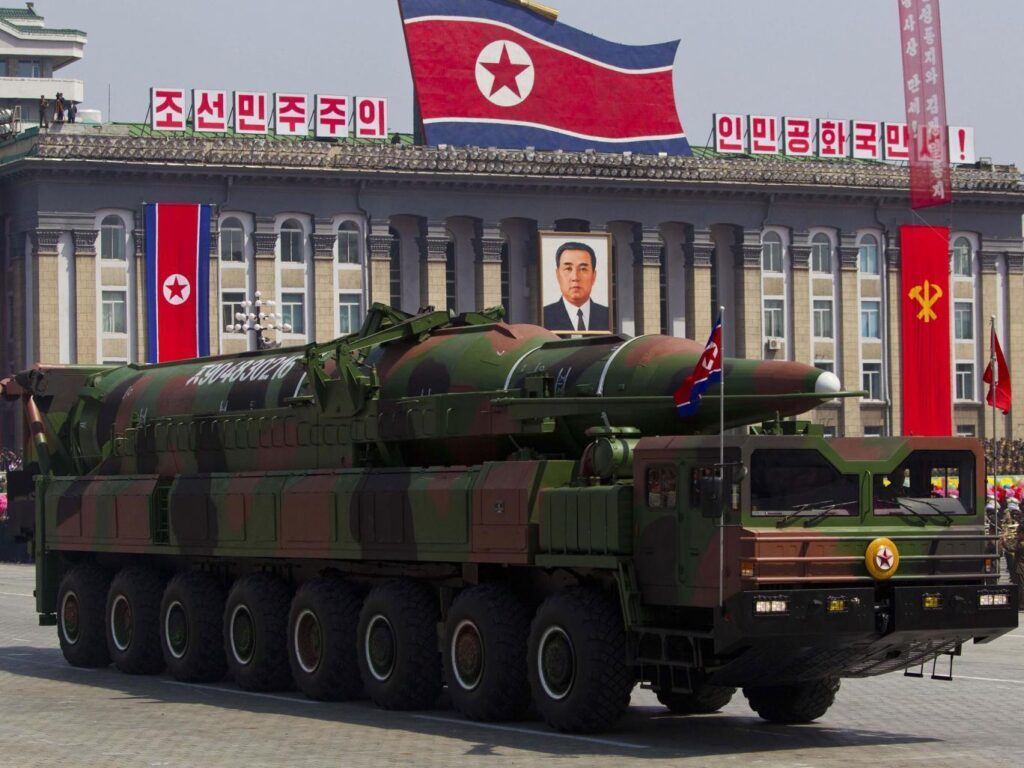 Photo: Associated Press
Photo: Associated Press

Adam MacDonald is an independent academic based in Halifax. He is a regular contributor to CDA Institute on Asia Pacific issues and provides here a succinct review of the realities facing the US and China as they look to play influential roles concerning North Korea.
The antagonistic relationship between North Korea and the United States is reaching a dangerous breaking point with the real potential for misunderstandings and miscalculations leading to armed conflict. At the centre of these tensions is Pyongyang’s continued nuclear and missile programs, specifically developing a force capable of targeting both regional adversaries and the continental United States. Augmenting these concerns is Pyongyang’s repeated threats of conducting pre-emptive nuclear attacks.
In response, President Trump announced the deployment of an ‘armada’ – an aircraft carrier battlegroup—to Northeast Asia, coinciding with joint exercises between the United States and South Korean armed forces (a regular component of their bilateral alliance). Along with increased military posturing, a constant stream of top Administration officials have made high-level diplomatic visits to Seoul to demonstrate Washington’s commitment to defending regional allies against any possible North Korean aggression.
This pattern of behaviour is largely in line with previous US governments. But in order to differentiate themselves from and cast blame on the Obama presidency, the Trump Administration has declared that Washington’s decade-long policy of ‘strategic patience’ with North Korea is over. The President also asserted that Pyongyang will not be allowed to achieve a nuclear-tipped Inter-Continental Ballistic Missile (ICBM) capability. During a time when they have shown a proclivity to conduct high profile kinetic military operations elsewhere, such declarations may indicate Washington is preparing a range of possible military strikes against North Korea. Despite having not ruled out military action, there is a concerted effort by Washington to exhaust all peaceful means to roll back escalating tensions, specifically by promoting a regional-led effort spearheaded by China.
For years Beijing has been criticized for its inability or unwillingness to leverage their position as North Korea’s largest trading partner and sole diplomatic protector to restrain North Korea’s nuclear program. President Trump was initially critical of Beijing’s apparent reluctance to get tough on Pyongyang, threatening to go it alone and resolve the issue without Chinese assistance. He has, for example, mused about meeting directly with Kim Jong-Un if the conditions were appropriate, though entertaining such suggestions would in effect legitimize North Korea as a nuclear power and equal: an unwanted precedent for other regimes (such as Iran) with adversarial relations with Washington to imitate. After President Trump’s first one on one meeting with Chinese President Xi Jinping earlier this year, however, there appears to be new understanding of and respect for China’s position on North Korea.
Despite popular depictions of the two ‘communist’ states as allies, Beijing’s relationship with Pyongyang is far more complicated. For decades, North Korea served as a strategic buffer for Beijing –keeping the Korean Peninsula divided to inhibit the emergence of a united Korea being a strong US ally as its neighbour. But North Korea has now transformed into a strategic liability whose nuclear ambitions and rhetoric have compromised China’s security and status in the region. North Korean nuclear developments, for example, justify continued regional military involvement of the United States, including the recent deployment of their Terminal High Altitude Area Defense system to South Korea causing concern (much of it exaggerated) in both Beijing and Moscow regarding the system’s advanced radars penetrating their respective airspaces. The inability to reign in Pyongyang damages Beijing’s status as a player which can meaningfully contribute towards regional stability and as a result confers leadership to Washington, entrenching their status as the major power in the region. Despite these liabilities, and the period of estrangement their relations have taken since Kim Jong-Un became leader, North Korea is a land neighbour of China and any conflict with or collapse of the regime in Pyongyang would have direct detrimental impacts to them including: the possibility of refugee crises on their border; nuclear fallout in Northeast China; and interactions between Chinese and American and allied forces on the Peninsula.
Beijing is not averse to curtailing relations with Pyongyang, demonstrated by the recent imposition of a complete ban on all North Korean coal imports, but determining the right calibration of response is a difficult endeavour. For example, a complete cessation of relations, (entailing tight border controls and cracking down of illegal trade which would pose a degree of complexity for Chinese security forces) could bring about the collapse of the regime, with unknown implications for how Pyongyang would act in its dying throes. Too little pressure, however, will draw the ire of the United States and other regional players who may adopt a more assertive, military oriented policy towards North Korea.
In their efforts to restrain Kim Jong-Un’s war mongering while at the same time inhibiting military action being taken against Pyongyang by the United States, Beijing must promote the abandonment of the policy, however begrudgingly, of denuclearization and accept the reality of living with a nuclear-armed North Korea. De facto acceptance of North Korea’s nuclear capability, however, does not entail acquiescence of Pyongyang as a legitimate nuclear power, much less a great power. While not addressing the core issues which have produced such tensions, for the immediate term the goal must be to arrest the brinkmanship strategies employed by both Washington and Pyongyang. Such a process necessitates recalibrating expectations, strategies and engagements through the new lens of accepting North Korea’s nuclear capabilities: a process only Beijing can facilitate and lead.